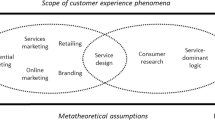Abstract
This paper introduces consumer empowerment as a promising research area. Going beyond lay wisdom that more control is always better, we outline several hypotheses concerning (a) the factors that influence the perception of empowerment, and (b) the consequences of greater control and the subjective experience of empowerment on consumer satisfaction and confidence.
Similar content being viewed by others
References
Bell, David E. (1982). ''Regret in Decision Making Under Uncertainty,'' Operations Research, 30, 961–981.
Benartzi, Shlomo, and Richard H. Thaler. (2001). ''How Much is Investor Autonomy Worth?,'' Working Paper, UCLA.
Carmon, Ziv, Klaus Wertenbroch, and Marcel Zeelenberg. (2002). ''Why Some Choices Don't Make You Feel as Good as They Should: Post-Decision Effects of Pre-Decision Adaptation,'' INSEAD Working Paper.
Dhar, Ravi. (1997). ''Consumer Preference for a No-Choice Option,'' Journal of Consumer Research, 24, 215–231.
Gilbert, Daniel T., and Timothy D. Wilson. (2000). ''Miswanting: Some Problems in the Forecasting of Future Affective States.'' In J. Forgas (ed.), Feeling and Thinking: The Role of Affect and Social Cognition, Cambridge: Cambridge University Press.
Gourville, John T., and Dilip Soman. (2000). ''Consumer Choice Behavior Among Wide Assortments: Is More Choice Always Better?'' Harvard Business School Working Paper 99–102.
Heath, Chip, Richard P. Larrick, and George Wu. (1999). ''Goals As Reference Points,'' Cognitive Psychology, 38, 79–109.
Iyengar, Sheena S., and Mark R. Lepper. (2000). ''When Choice is Demotivating: Can One Desire Too Much of a Good Thing?,'' Journal of Personality and Social Psychology, 76, 995–1006.
Kahneman, Daniel. (1994). ''New Challenges to the Rationality Assumption,'' Journal of Institutional and Theoretical Economics, 150, 18–36.
Koriat, Asher, Sarah Lichtenstein, and Barauch Fischhoff. (1980). ''Reasons for Confidence,'' Journal of Experimental Psychology: Human Learning and Memory, 6, 107–118.
Kreps, David. (1979). ''A Representation Theorem for Preference for Flexibility,'' Econometrica, 47, 565–577.
Langer, Ellen J., and Judith Rodin. (1976). ''The Effects of Choice and Enhanced Personal Responsibility for the Aged:AField Experiment in an Institutional Setting,'' Journal of Personality and Social Psychology, 34, 191–198.
Langer, Ellen J. (1983). The Psychology of Control. Beverly Hills: Sage Publications.
Loewenstein, George, Leigh Thompson, and Max Bazerman. (1989). ''Social Utility and Decision Making in Intertemporal Contexts,'' Journal of Personality and Social Psychology, 57, 426–441.
Muthukrishnan, A. V., and Frank R. Kardes. (2001). ''Persistent Preferences for Product Attributes: The Effects of Initial Choice Context and Uninformative Experience,'' Journal of Consumer Research, 28, 89–104.
Ratner, Rebecca K., Barbara E. Kahn, and Daniel Kahneman. (1999). ''Choosing Less-Preferred Experiences for the Sake of Variety,'' Journal of Consumer Research, 26, 1–15.
Read, Daniel, and George Loewenstein. (1995). ''Diversification Bias: Explaining the Discrepancy in Variety Seeking Between Combined and Separated Choices,'' Journal of Experimental Psychology: Applied, 1, 34–49.
Schlenker, B. R., M. F. Weigold, and J. R. Hallam. (1990). ''Self-Serving Attributions in Social Context: Effects of Self-Esteem and Social Pressure,'' Journal of Personality and Social Psychology, 58, 855–863.
Scitovsky, Tibor. (1992). The Joyless Economy: The Psychology of Human Satisfaction. Oxford: Oxford University Press.
Tversky, Amos, and Eldar Shafir. (1992). ''Choice Under Conflict: The Dynamics of Deferred Choice,'' Psychological Science, 3, 358–361.
Wertenbroch, Klaus. (1998). ''Consumption Self-Control by Rationing Purchase Quantities of Virtue and Vice,'' Marketing Science, 17, 317–337.
Wilson, T. D., D. J. Lisle, J. W. Schooler, S. D. Hodges, K. J. Klaaren, and S. J. LaFleur. (1993). ''Introspecting About Reasons Can Reduce Post-Choice Satisfaction,'' Personality and Social Psychology Bulletin, 19, 331–339.3
Author information
Authors and Affiliations
Corresponding author
Rights and permissions
About this article
Cite this article
Wathieu, L., Brenner, L., Carmon, Z. et al. Consumer Control and Empowerment: A Primer. Marketing Letters 13, 297–305 (2002). https://doi.org/10.1023/A:1020311914022
Issue Date:
DOI: https://doi.org/10.1023/A:1020311914022




